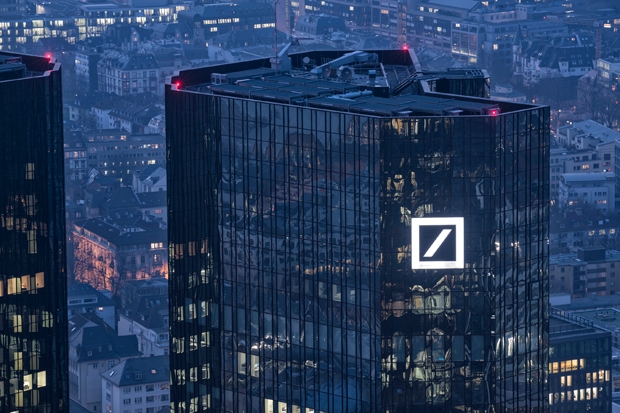‘Can anyone seriously imagine the German state and corporate establishment allowing the bank that bears their country’s name to go down?’ I asked in February, adding rather bravely, ‘Of course they won’t.’ And that, I fear, makes my next question, ‘Am I about to eat my hat?’ Shares in Deutsche Bank have plunged to their lowest level since 1992 as the US Department of Justice seeks to impose a $14 billion fine relating to Deutsche’s issuance of mortgage-backed securities before the 2008 crisis, and rumours say Chancellor Angela Merkel has ruled out a state bailout.
Deutsche boss John Cryan says the bank hasn’t asked for her help to fight its US battle and is in compliance with all its capital ratios, both of which may be true. The story highlights the way regulators and overseers make matters worse by spotlighting weakness for markets to amplify: the IMF in June called Deutsche ‘the most important net contributor to systemic risks’ in the global banking scene, while the DoJ cannot have been unaware that a fine almost as big as the bank’s current market capitalisation would cause that capitalisation to shrink even further and shake depositors’ confidence, with untold potential repercussions across Europe and beyond.
So what’s next, on the hat-eating front? When I was writing in February, unease around Deutsche focused chiefly on the value of its outstanding ‘cocos’, or contingent convertible bonds — which the market had concluded were never a good idea in the first place but which were not a big piece of its balance sheet. There was a sense of unfinished post-crash business lurking in the European banking sector, but much less so in Germany than in the southern eurozone. Cryan’s reassurance that his bank was ‘rock solid’ prompted a 40 per cent uplift in its share price before sellers and short-sellers set to work again in March.
Now, however, pundits are reaching into their cliché sack for ‘existential crisis’ once more as EU regulators prepare to launch another crackdown, this time on ‘minimum required eligible liabilities’, that will inevitably highlight new points of weakness.
Despite Mrs Merkel’s alleged stance — and bearing in mind her own weakness in domestic politics these days — I still very much doubt that Germany and the European Central Bank together would watch Deutsche go down then wait to see which Italian banks followed. Much more likely, given the depletion of Deutsche’s capital by the US fine and the difficulty it might face raising new equity, is a strategic merger, pushed by the authorities, that would also achieve a cut in operating costs. If a tie-up is unlikely with German rival Commerzbank, which is already going through its own painful restructuring, then the search must be on for a cross-border partnership that would also play to the narrative of ever-deeper European integration. Watch this space, while I hang on to my hat.
What’s Twitter worth?
Can Twitter be worth more than Deutsche? On Tuesday, as rumours swirled of possible bidders for the microblogging site, the market was valuing it at $20 billion, compared to $18 billion for the troubled German bank. That might be a reasonable assessment of their relative prospects, or it might be confirmation that social media valuations are always bonkers. You’ll gather from my tone that I’m no Twitter devotee, and am unconvinced by its attractions as a business: it has never made a profit in a decade of existence, has plateaued at around 300 million users (Facebook has 1.7 billion), done little to develop its original offering beyond attracting a global army of trolls, and is threatened by hot competitors such as Snapchat.
But none of that has deterred Disney, Google and the cloud-computing giant Salesforce from lining up as potential buyers. Nor has the history of now-forgotten sites such as Bebo (sold to AOL for $850 million) and MySpace (sold to Rupert Murdoch for $580 million) that evaporated to near-zero values within a five-to-seven year lifecycle. Likewise Yahoo’s $1.1 billion acquisition of Tumblr in 2013 (which I said then ‘may not end well’) has had to be heavily written down as its performance has disappointed. Microsoft’s more recent $26 billion purchase of LinkedIn — a relatively durable site for business contacts, in contrast to Twitter’s ephemeral tittle-tattle — remains a test case, and is evidently being used as a price benchmark by Twitter’s adviser, Goldman Sachs.
Google (through its holding company Alphabet) has oodles of cash in hand, plenty of reasons to covet the goldmine of personal data held by Twitter and an appetite for off-the-wall acquisitions: it can point to the success of YouTube, which it bought for what many thought a way-too-high $1.6 billion in 2006. Disney, meanwhile, apparently sees potential synergies between Twitter and its sports channel ESPN, and covets Twitter’s younger user base.
But experience suggests, as I’ve said before, that in this arena it’s far better to be the selling founder than the buying giant: so (in a headgear-themed column this week) I doff my cap to Jack Dorsey, Evan Williams and the original Twitter crew, who stand to collect billions between them. But I can’t be bothered to tweet about it.
Iceland: sue Iceland
Iceland wants to sue Iceland for misuse of its name. The former is a north Atlantic island whose fishermen-turned-financiers set standards of irresponsibility in the mid-2000s that made Wall Street’s Bear Stearns and Lehman Bros look like small-town building societies, attracting £20 billion of British depositors’ money into their mismanaged banks as they launched their own national economy into a mad caricature of boom and bust. The latter is a British supermarket chain, founded by Malcolm Walker in Oswestry in 1969 and offering a value-for-money -frozen-food range that is well appreciated by budget-conscious family shoppers. I’d say if anyone has a claim for reputational damage, it’s Iceland the retailer that should be suing Iceland the country.







Comments